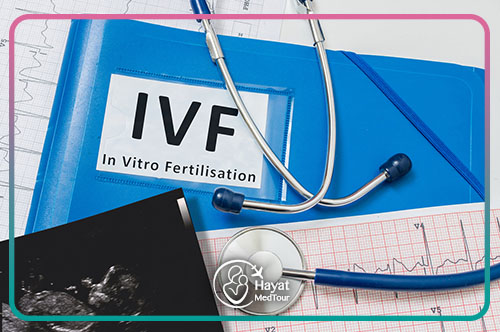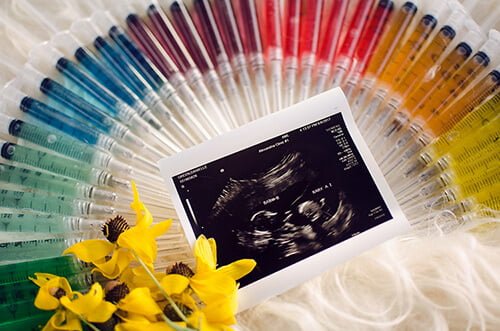Hayat MedTour is a medical tourism facilitator in Iran that has specialized in providing fertility assistance, infertility treatment and IVF in Iran at the best quality and affordable prices
Wednesday, April 27, 2022
HayatMedTour | Fertility Treatment in Iran | IVF in Iran
Sunday, September 26, 2021
Tips to Prepare for Fertility Treatment
Most Important Tips to Prepare for Fertility Treatment
Over 80% of the time, fertility drugs can stimulate ovulation—fertility treatments are being done now more than ever. Current technology offers fertility treatments to make pregnancy a reality for many couples who would otherwise struggle. Fertility treatments are a highly involved process and can be both emotionally and physically taxing. However, certain things can help you prepare for fertility treatments to alleviate stress and increase the likelihood of a healthy pregnancy.
7 Tips to prepare for fertility treatments
- Quit unhealthy habits - When starting fertility treatments, quit smoking, drinking, and staying up late to help prepare your body for pregnancy while increasing the chances of getting pregnant.
- Maintain a healthy weight - Being overweight can affect pregnancy. Excess weight increases the risk of a miscarriage and can affect outcomes with in vitro fertilization procedures (IVF). A high BMI also affects the safety of undergoing anesthesia or sedation, which is necessary with IVF.
- Eat a balanced diet - Eating a wide variety of fruits, vegetables, lean proteins, and healthy fats can help you maintain a good weight while building up nutrition for better overall health.
- Get quality sleep - Sleep is crucial for cellular repair, maintaining stress levels, and essential for fertility. Set a goal of getting between 7/ 9 hours of quality sleep each night.
- Maintain stress levels- Stress can hurt the chances of successful fertility. Seek ways to maintain stress during this process. Try things like acupuncture, walking, journaling, and meditating to decrease anxiety.
- Change workout routines - Exercise is great for increasing fertility. Replacing running and extreme exercising like bodybuilding to a gentler routine. Yoga, walking, swimming, hiking, and biking are wonderful ways to get gentle exercise during fertility treatments and pregnancy.
- Begin taking a prenatal vitamin - It is recommended to increase nutrients during fertility treatments. Prenatal vitamins are an excellent choice to ensure the body has enough folic acid, which aids in developing the brain and spinal cord during pregnancy. Please discuss with your doctor what prenatal vitamins they recommend.
Wednesday, October 14, 2020
male infertility treatment by IVF
Sometimes, for male infertility treatment, IVF is the best treatment option. When the semen analysis is abnormal and identifies a malefactor, it’s important to look for the cause. If the low sperm count appears to hormone-related, caused by an infection, or related to a male anatomic abnormality, basic treatments may be used. If these do not work, or if it is a more severe case of male infertility, IVF is usually the treatment of choice.
Options other than IVF for male infertility
For hormonal imbalances like a low testosterone level, Doctors may choose medications like Clomid or fertility shots. The partners of men with decreased sperm counts and normal hormone levels will often undergo IUI. This is a simple and relatively inexpensive treatment for mild cases of male infertility.
Anatomical abnormalities that contribute to male infertility often require further evaluation by a urologist. Urologists are specialists regarding the male reproductive system. They will work with the Doctor to determine what treatment is necessary.
If the sperm count is too low for IUI, IVF for male infertility may be the best treatment option. This treatment is a very successful option for couples with male factor infertility.
When do we recommend IVF for male infertility?
If a semen analysis reveals a very low concentration of normal sperm, the Doctor often will recommend IVF for male infertility. This is because the chances of success are much better than timed intercourse or IUI.
IVF is also a good option when there are multiple fertility factors, such as a low sperm count in combination with a blocked tube, difficulty in ovulation, or advanced age of the woman. IVF can be the most effective treatment for couples in these situations by increasing the chance of fertilization of the egg.
The reason why is as follows:
- Sperm with poor motility can still be used to fertilize eggs through IVF. By placing sperm and egg in close proximity in a petri dish, the poorly motile sperm do not have to travel far to reach the egg, and fertilization is controlled in the lab.
- Low sperm counts can still achieve fertilization through IVF
Because the egg and sperm meet in the lab, the sperm have no chance of “getting lost” in the female reproductive tract. Normally, sperm travel along the specific path to reach the egg, but many fall off during the trip. If there isn’t enough sperm that can make the trek to the egg, fertilization never happens.
- For the severe male factor, IVF with intracytoplasmic sperm injection (ICSI) will be performed.
- ICSI involves carefully choosing a single sperm and injecting this sperm directly into the egg, which improves the chance for fertilization. ICSI is also performed when sperm is retrieved by performing a biopsy of the testicle, also known as TESE (testicular sperm extraction), or when a frozen sperm specimen is used.
Tuesday, September 22, 2020
risks of IVF
IVF treatment doesn't always result in pregnancy, and it can be both physically and emotionally demanding. You should be offered counseling to help you through the process.
There are also a number of health risks involved, including:
- side effects from the medications used during treatment, such as hot flushes and headaches
- multiple births (such as twins or triplets) – this can be dangerous for both the mother and the children
- an ectopic pregnancy – where the embryo implants in the fallopian tubes, rather than in the womb
- ovarian hyperstimulation syndrome (OHSS) – where too many eggs develop in the ovaries
Read more about risks of IVF.
Saturday, September 5, 2020
IVF Costs in Iran
The average cost of an IVF cycle in the U.S. is $12,400, according to the American Society of Reproductive Medicine. This price will vary depending on where you live, the number of medications you're required to take, the number of IVF cycles you undergo, and the amount your insurance company will pay toward the procedure. You should thoroughly investigate your insurance company's coverage of IVF and ask for a written statement of your benefits. Although some states have enacted laws requiring insurance companies to cover at least some of the costs of infertility treatment, many states haven't.Costs-of-IVF

The cost of IVF in Iran is more affordable than in other countries. Also, in Iran, the infertility treatment services such as IVF have a high quality in the region and in the world. The low-cost of IVF in Iran is due to the low doctors’ wages and inexpensive services in the clinic. The medications cost are the same all over the world. Learn more about IVF cost in Iran: The cost of IVF in Iran
Tuesday, September 1, 2020
Issues With IVF
Any embryos that you do not use in your first IVF attempt can be frozen for later use. This will save you money if you undergo IVF a second or third time. If you do not want your leftover embryos, you may donate them to another infertile couple, or you and your partner can ask the clinic to destroy the embryos. Both you and your partner must agree before the clinic will destroy or donate your embryos.

A woman's age is a major factor in the success of IVF for any couple. For instance, a woman who is under age 35 and undergoes IVF has a 39.6% chance of having a baby, while a woman over age 40 has an 11.5% chance. However, the CDC recently found that the success rate is increasing in every age group as the techniques are refined and doctors become more experienced.
Tuesday, August 25, 2020
IVF success rate
IVF success rate depends on a number of factors, including the reason for infertility, where you're having the procedure done, and your age.

The CDC compiles national statistics for all assisted reproductive technology (ART) procedures performed in the U.S., including IVF, GIFT, and ZIFT, although IVF is by far the most common; it accounts for 99% of the procedures. The most recent report from 2016 found:
- Pregnancy was achieved in an average of 27.3% of all cycles (higher or lower depending on the age of the woman).
- The percentage of cycles that resulted in live births was 22.2% on average (higher or lower depending on the age of the woman).
Saturday, August 15, 2020
What Can I Expect From IVF?
The first step in IVF involves injecting hormones so you produce multiple eggs each month instead of only one. You will then be tested to determine whether you're ready for egg retrieval.

Prior to the retrieval procedure, you will be given injections of a medication that ripens the developing eggs and starts the process of ovulation. Timing is important; the eggs must be retrieved just before they emerge from the follicles in the ovaries. If the eggs are taken out too early or too late, they won't develop normally. Your doctor may do blood tests or an ultrasound to be sure the eggs are at the right stage of development before retrieving them. The IVF facility will provide you with special instructions to follow the night before and the day of the procedure. Most women are given pain medication and the choice of being mildly sedated or going under full anesthesia.
During the procedure, your doctor will locate follicles in the ovary with ultrasound and remove the eggs with a hollow needle. The procedure usually takes less than 30 minutes, but may take up to an hour.
Immediately following the retrieval, your eggs will be mixed in the laboratory with your partner's sperm, which he will have donated on the same day.
While you and your partner go home, the fertilized eggs are kept in the clinic under observation to ensure optimal growth. Depending on the clinic, you may even wait up to five days until the embryo reaches a more advanced blastocyst stage.
Once the embryos are ready, you will return to the IVF facility so doctors can transfer one or more into your uterus. This procedure is quicker and easier than the retrieval of the egg. The doctor will insert a flexible tube called a catheter through your vagina and cervix and into your uterus, where the embryos will be deposited. To increase the chances of pregnancy, most IVF experts recommend transferring up to three embryos at a time. However, this means you could have multiple pregnancies, which can increase health. risks for both you and the babies
Following the procedure, you would typically stay in bed for several hours and be discharged four to six hours later. Your doctor will probably perform a pregnancy test on you about two weeks after the embryo transfer.
In cases where the man's sperm count is extremely low or there is poor motility (movement of the sperm), doctors may combine IVF with a procedure called intracytoplasmic sperm injection. In this procedure, sperm is taken from semen -- or in some cases right from the testicles -- and inserted directly into the egg. Once a viable embryo is produced, it is transferred to the uterus using the usual IVF procedure.



